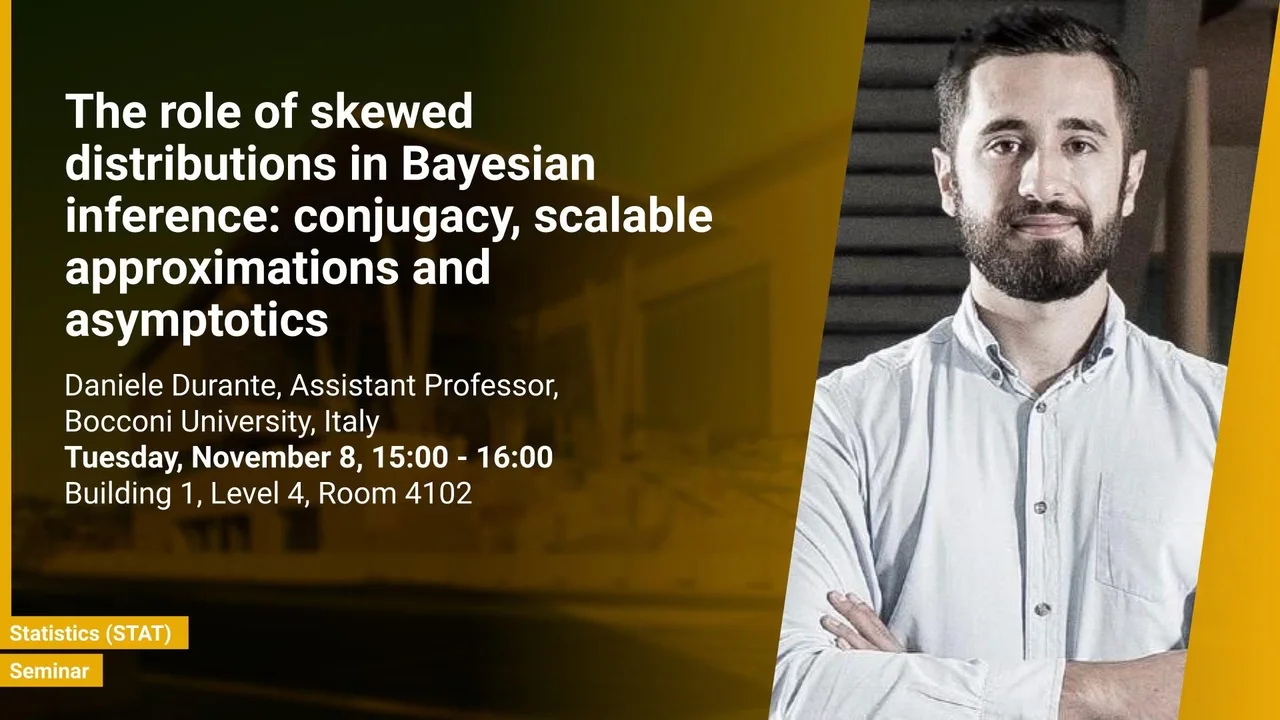
The role of skewed distributions in Bayesian inference: conjugacy, scalable approximations and asymptotics
In this talk, I will review, unify and extend recent advances in Bayesian inference and computation for such a class of models, proving that unified skew-normal (SUN) distributions (which include Gaussians as a special case) are conjugate to the general form of the likelihood induced by these formulations. This result opens new avenues for improved posterior inference, under a broad class of widely-implemented models, via novel closed-form expressions, tractable Monte Carlo methods based on independent and identically distributed samples from the exact SUN posterior, and more accurate and scalable approximations from variational Bayes and expectation-propagation. These results will be further extended, in asymptotic regimes, to the whole class of Bayesian generalized linear models via novel limiting approximations relying on skew-symmetric distributions.
Overview
Abstract
A broad class of regression models that routinely appear in several fields of application can be expressed as partially or fully discretized Gaussian linear regressions. Besides incorporating the classical Gaussian response setting, this class crucially encompasses probit, multinomial probit and tobit models, among others, and further includes key extensions of such formulations to multivariate, non-linear and dynamic contexts. The relevance of these representations, which often act also as building-blocks of more complex constructions, has motivated decades of active research within the Bayesian field. A main reason for this constant interest is that, unlike for the Gaussian response setting, the posterior distributions induced by these models do not apparently belong to a known and tractable class, under the commonly-assumed Gaussian priors. This has led to the development of several alternative solutions for posterior inference relying either on sampling-based methods or on deterministic approximations, that often experience scalability, mixing and accuracy issues, especially in high dimension. In this talk, I will review, unify and extend recent advances in Bayesian inference and computation for such a class of models, proving that unified skew-normal (SUN) distributions (which include Gaussians as a special case) are conjugate to the general form of the likelihood induced by these formulations. This result opens new avenues for improved posterior inference, under a broad class of widely-implemented models, via novel closed-form expressions, tractable Monte Carlo methods based on independent and identically distributed samples from the exact SUN posterior, and more accurate and scalable approximations from variational Bayes and expectation-propagation. These results will be further extended, in asymptotic regimes, to the whole class of Bayesian generalized linear models via novel limiting approximations relying on skew-symmetric distributions.
Brief Biography
Daniele Durante is an Assistant Professor of Statistics at the Department of Decision Sciences, Bocconi University, Italy, and a Research Affiliate to the Bocconi Institute for Data Science and Analytics (BIDSA). His research is characterized by an interdisciplinary approach at the intersection of methods, computations, theory and applications, with a particular interest on Bayesian inference. He is currently Associate Editor of Biometrika, Journal of Computational and Graphical Statistics and Journal of Multivariate Analysis. For more information see: https://danieledurante.github.io/web/.
